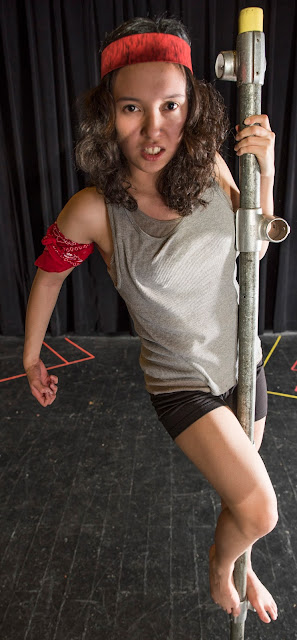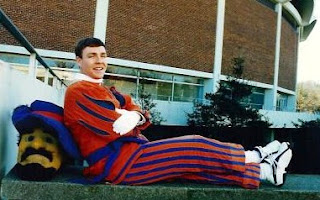“A Wonderful fact to reflect upon, that every human creature is constituted to be that profound secret and mystery to every other.”—Charles Dickens,
A Tale of Two Cities, from a passage quoted by Sarah Ruhl in the published script of
Dead Man’s Cell Phone.
Dead Man’s Cell Phone premiered in 2007 at the Woolly Mammoth Theatre in Washington, D.C. (starring Polly Noonan, who bears an uncanny resemblance to its author, Sarah Ruhl.) It won the Helen Hayes Award for Outstanding New Play in the Washington DC area for that production.
It was produced in New York City at Playwright’s Horizon in 2008, with Marie Louise Parker as Jean. In his New York Times
review, Charles Isherwood called it a “beguiling new comedy.” He quoted a typical line from the play and commented: “This seemingly absurd statement is typical of the startling leaps made by the characters in Ms. Ruhl’s work, which blends the mundane and the metaphysical, the blunt and the obscure, the patently bizarre and the bizarrely moving.”
“Dead Man’s Cell Phone is like a fairly tale,”
said Jessica Thebus, director of the Steppenwolf production in 2008. Of Ruhl she said “Her plays are very theatrical, and I would say not unlike Greek theatre. There are many differences of course but they share a mythic landscape that contains very human problems. In
Dead Man’s Cell Phone you get a magical place...and yet the problems and issues the characters are dealing with are extremely familiar and sometimes mundane. The combination of the mundane and the magical is fertile theatrically, and it makes Sarah a playwright who is uniquely well-suited to the theatre.”
“
Dead Man’s Cell Phone works as a sustained trance or dream, from the moment the audience enters the world until the end,” said Andre Pluess, sound designer for that production.
North Coast theatregoers may remember the Oregon Shakespeare Festival production in 2009. For Oregon Live, Marty Hughley
wrote that it “draws us so fully into Ruhl’s mix of the poetic and the silly that there’s no cause to question the logic.”
“It’s a joyride through the absurdity of trying to make simple connections in a world overwhelmed with interconnectivity,”
wrote Robert Hurwitt, reviewing the 2009 SF Playhouse production in San Francisco. “That it’s strangely touching as well is just another reason to get to the Playhouse. Ruhl rules.”
Sarah Ruhl grew up in Wilmette, Illinois, a leafy suburb of Chicago, some 14 miles from downtown. She came from a happy family, though she felt her father was limited by his job marketing toys. He loved music and words, including puns. Her mother taught English and in the evenings acted and directed. Sarah remembered her mother coming down the stairs to dinner reciting a speech from Ionesco’s
Bald Soprano.
Both parents engaged Sarah and her sister Kate in play that had educational purposes. Sarah was soon part of her mother Kathleen’s theatrical life. “One of the most intense theatrical experiences for her was when I directed
Enter Laughing,” Kathleen said. “She got to know all the actors. By that point, people would ask her for her notes. She was six or seven.”
 |
| Eurydice |
In school however fellow students were not always charmed by Sarah’s intelligence, but her home life gave her confidence. “In third grade, somebody sent me a poison-pen letter,” Ruhl said. “I corrected the punctuation and sent it back.”
Though she wrote a play in fourth grade (a courtroom debate between an isthmus and an island that her teacher declined to produce) and participated in a youth theatre group with such future luminaries as actors John and Joan Cusack, she resisted pursuing a career as a playwright--
even after a workshop with playwright Paula Vogel, when Vogel told her she could have one.
But after Brown University and a year at Oxford studying English literature, she wrote
Passion Plays, which Vogel arranged to be produced at Trinity Repertory in Providence. It was an immediate success. It has been produced several more times in an extended version.
Vogel was not surprised. “She’s going to become her own vocabulary word,” Vogel said. “There’s not anyone else like her.”
 |
| The Clean House, Goodman Theatre |
Ruhl’s beloved father died when she was 20. The humor and grace with which he faced cancer and death influenced her plays, particularly the two produced in 2004:
The Clean House and
Eurydice. The latter also makes explicit her engagement with myth, both Greek classics and Lewis Carroll.
The Clean House was a Pulitzer Prize nominee.
In 2006 Ruhl received a MacArthur “genius” grant. That year her play
Demeter in the City was produced, again reflecting her interest in myth.
Probably her best-known play premiered at Berkeley Rep in 2009:
In the Next Room (or The Vibrator Play). It was her first play to make it to Broadway, and her second Pulitzer Prize finalist. Locally, Ferndale Rep produced it in 2012.
In between came
Dead Man’s Cell Phone. At the time of its New York production, New Yorker theatre critic John Lahr wrote an extensive
profile of Sarah Ruhl for that magazine. Specifically about this play, Lahr wrote that it is “ a meditation on death, love, and disconnection in the digital age; like her other works, it inhabits a dramatic netherworld between personal suspense and suspended time.” He also describes it as “a mad pilgrimage of an imagination as it is invaded and atomized by the phone, which transforms private as well as public space."
“Cell phones, iPods, wireless computers will change people in ways we don’t even understand,” Ruhl told Lahr. “We’re less connected to the present. No one is where they are. There’s absolutely no reason to talk to a stranger anymore—you connect to people you already know. But how well do you know them? Because you never see them—you just talk to them. I find that terrifying.”
In explaining her approach to playwriting, Ruhl told him: “Aristotle has held sway for many centuries, but I feel our culture is hungry for Ovid’s way of telling stories,” she said, describing Ovid’s narrative strategy as “one thing transforming into another.”
I like plays that have revelations in the moment, where emotions transform almost inexplicably,” Ruhl said. This certainly applies to
Dead Man’s Cell Phone.
But Ruhl is also committed to an approach that is fundamentally comic. In explaining this to Lahr, she referred to a 1980s essay by the great Italian writer Italo Calvino, published in his book
Six Memos for the Next Millennium. Calvino suggests six qualities that should inform literature in the future, including quickness, exactitude, visibility and multiplicity. But above all, Calvino championed “lightness.” He wrote:
“Were I to choose an auspicious image for the new millennium, I would choose that one: the sudden agile leap of the poet-philosopher who raises himself above the weight of the world, showing that with all his gravity he has the secret of lightness, and that what many consider to be the vitality of the times—noisy, aggressive, revving and roaring—belongs to the realm of death, like a cemetery for rusty old cars.”
Lightness isn’t stupidity,” Ruhl told Lahr. “It’s actually a philosophical and aesthetic viewpoint, deeply serious, and has a kind of wisdom—stepping back to be able to laugh at horrible things even as you’re experiencing them.”
Ruhl's favorite play, she
told the New York Times Book Review earlier this year, is either King Lear or A Midsummer Night's Dream, "depending on if I'm feeling melancholy or optimistic."
And whom does she want to write her life story? "J.K. Rowling, of course."


















































